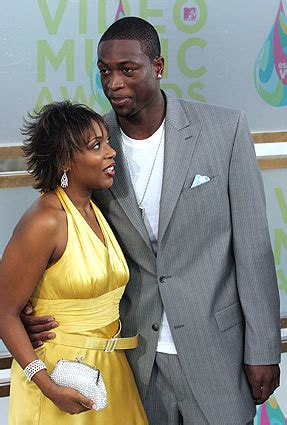
Dwyane Wade has filed a lawsuit against his ex-wife, Siohvaughn Funches-Wade, claiming he was left with “no choice” but to take legal action due to her repeated “salacious and false” allegations, including claims of sexually transmitted diseases and extramarital affairs.
Former NBA star Dwyane Wade is suing his ex-wife, Siohvaughn Funches-Wade, citing defamation and emotional distress stemming from what he describes as a relentless campaign of false accusations. According to court documents, Wade claims that Funches-Wade’s allegations, which include assertions of him contracting sexually transmitted diseases and engaging in extramarital affairs during their marriage, have caused significant damage to his reputation and emotional well-being. The lawsuit marks a significant escalation in the ongoing legal battles between the former couple, who divorced in 2010 after a tumultuous marriage.
Wade’s legal team asserts that Funches-Wade’s accusations are not only baseless but also strategically timed to coincide with critical moments in Wade’s life, such as his Hall of Fame induction and his son Zaya’s gender transition. The lawsuit alleges that Funches-Wade’s actions are a deliberate attempt to harass and defame Wade, motivated by personal animosity and a desire to inflict emotional pain. The filing highlights specific instances where Funches-Wade allegedly made these defamatory statements, including social media posts, interviews, and court filings.
“I have been threatened, harassed, and stalked as a result of Siohvaughn’s conduct,” Wade stated in court documents, underscoring the severity of the situation. He claims that Funches-Wade’s actions have not only damaged his reputation but have also created a climate of fear and insecurity for him and his family. The lawsuit seeks compensatory and punitive damages, as well as injunctive relief to prevent Funches-Wade from making further defamatory statements.
The history between Wade and Funches-Wade has been marked by legal disputes and public disagreements. Their divorce in 2010 was highly contentious, involving disputes over custody, financial support, and property division. Despite reaching a settlement agreement, the conflicts have persisted, with Funches-Wade repeatedly challenging the terms of the agreement and accusing Wade of various misconducts. The current lawsuit represents a new chapter in this long-standing saga, with Wade taking a more assertive stance to protect his reputation and emotional well-being.
Funches-Wade has yet to formally respond to the lawsuit, but she has previously denied similar allegations and accused Wade of attempting to silence her. Her legal representatives are expected to file a response in the coming weeks, setting the stage for what is likely to be a protracted and acrimonious legal battle. The outcome of the lawsuit could have significant implications for both parties, potentially impacting their financial resources, reputations, and future legal interactions.
The case also raises broader questions about the legal recourse available to public figures who are subjected to defamatory statements. While the First Amendment protects freedom of speech, it does not shield individuals from liability for false statements that cause harm to another person’s reputation. Wade’s lawsuit argues that Funches-Wade’s allegations cross the line between protected speech and actionable defamation, warranting legal intervention.
As the lawsuit progresses, it is likely to attract significant media attention, given Wade’s celebrity status and the sensitive nature of the allegations. The case will be closely watched by legal experts and public relations professionals, who will be analyzing the legal arguments, evidence, and potential outcomes. It also serves as a reminder of the challenges faced by high-profile individuals in navigating personal disputes and protecting their reputations in the age of social media and instant communication.
The legal battle unfolds against the backdrop of Wade’s successful post-NBA career, which has included television appearances, endorsements, and philanthropic endeavors. His reputation as a respected athlete and community leader is now being tested by the allegations leveled by his ex-wife. The lawsuit is not just a personal matter for Wade but also a professional one, with potential implications for his business ventures and public image.
The lawsuit underscores the complex dynamics of divorce and the challenges of co-parenting after a relationship breakdown. Despite the passage of time, the emotional wounds and legal grievances from their marriage continue to fester, leading to further conflict and litigation. The case highlights the importance of clear communication, mutual respect, and effective legal representation in resolving disputes and protecting the interests of all parties involved.
Wade’s decision to file the lawsuit reflects a determination to defend his reputation and hold Funches-Wade accountable for her alleged actions. It is a high-stakes gamble that could have far-reaching consequences for both parties. As the case moves forward, the legal system will be tasked with weighing the evidence, assessing the credibility of the witnesses, and determining whether Funches-Wade’s allegations constitute actionable defamation. The outcome will not only resolve the immediate dispute but also set a precedent for similar cases in the future.
The lawsuit documents reveal a deeply personal and acrimonious conflict that has spanned over a decade. Wade claims that Funches-Wade’s actions have caused him significant emotional distress, anxiety, and reputational harm. He asserts that her allegations are not only false but also malicious, intended to damage his relationships, career, and overall well-being.
In addition to the allegations of sexually transmitted diseases and extramarital affairs, Wade claims that Funches-Wade has made false statements about his parenting abilities, financial dealings, and personal character. He alleges that she has used social media and other platforms to spread these false narratives, reaching a wide audience and amplifying the damage to his reputation.
Wade’s legal team argues that Funches-Wade’s actions are part of a pattern of harassment and defamation that has persisted for years. They claim that she has repeatedly violated court orders, made false accusations to law enforcement, and engaged in other forms of misconduct designed to disrupt Wade’s life.
The lawsuit seeks a variety of remedies, including compensatory damages to cover Wade’s financial losses and emotional distress, punitive damages to punish Funches-Wade for her alleged misconduct, and injunctive relief to prevent her from making further defamatory statements. Wade also seeks a court order requiring Funches-Wade to retract her false statements and issue a public apology.
The case is expected to be complex and time-consuming, involving extensive discovery, depositions, and expert testimony. Both sides are likely to present a wide range of evidence to support their respective claims. The outcome will depend on the court’s assessment of the credibility of the witnesses, the strength of the evidence, and the applicable legal standards.
The lawsuit also raises ethical questions about the role of lawyers in representing clients in high-profile defamation cases. Attorneys have a duty to zealously advocate for their clients’ interests, but they also have an obligation to ensure that their conduct is ethical and professional. In this case, both Wade’s and Funches-Wade’s lawyers will be under scrutiny to ensure that they are adhering to the highest standards of legal ethics.
The case has the potential to set a precedent for other defamation lawsuits involving public figures and their former spouses. It could also influence the way courts handle disputes over custody, financial support, and property division in divorce cases. The outcome will be closely watched by family law attorneys, media lawyers, and public relations professionals.
Wade’s decision to sue Funches-Wade reflects a growing trend among public figures to take legal action against individuals who make false and defamatory statements about them. In the age of social media, it has become easier for false information to spread quickly and widely, causing significant damage to reputations and careers. As a result, many public figures are turning to the courts to protect their interests and hold those who defame them accountable.
The lawsuit is a reminder of the importance of truth and accuracy in public discourse. False and defamatory statements can have devastating consequences for individuals and society as a whole. The legal system provides a mechanism for victims of defamation to seek redress and for those who make false statements to be held responsible for their actions.
The case also underscores the need for caution and restraint in making public statements about others. Individuals should think carefully before posting or publishing information that could be construed as defamatory. They should also be aware of the legal consequences of making false statements.
Wade’s lawsuit is a high-stakes legal battle that could have far-reaching implications. It is a reminder of the challenges faced by public figures in protecting their reputations and the importance of truth and accuracy in public discourse. As the case moves forward, it will be closely watched by legal experts, media professionals, and the public at large.
The lawsuit comes at a time when Wade is enjoying considerable success in his post-NBA career. He has become a popular television analyst, brand ambassador, and entrepreneur. His reputation as a respected athlete and community leader has helped him to build a successful business empire. The allegations made by Funches-Wade threaten to undermine his success and damage his hard-earned reputation.
Wade’s legal team is confident that they will prevail in the lawsuit. They have assembled a strong case based on evidence of Funches-Wade’s false statements and malicious intent. They are prepared to fight vigorously to protect Wade’s reputation and hold Funches-Wade accountable for her actions.
The lawsuit is a reminder of the complexities of family law and the challenges of resolving disputes between former spouses. Divorce can be a difficult and emotional process, and it is not uncommon for conflicts to continue long after the divorce is finalized. The legal system provides a framework for resolving these disputes, but it is ultimately up to the parties to work together to find a solution that is fair and equitable.
Wade’s lawsuit is a test of his resolve and resilience. He has faced many challenges in his life, both on and off the basketball court. He has always shown a determination to overcome obstacles and achieve his goals. The lawsuit is another challenge that he is determined to overcome.
The case is a reminder of the importance of integrity and character. Wade has always been known for his integrity and character. He has been a role model for young people and a positive influence in his community. The allegations made by Funches-Wade threaten to tarnish his image, but he is confident that he will emerge from this challenge with his reputation intact.
The lawsuit is a reminder of the power of the media. In the age of social media, information can spread quickly and widely. False and defamatory statements can have a devastating impact on reputations and careers. It is important for individuals to be aware of the power of the media and to take steps to protect themselves from false and defamatory statements.
Wade’s lawsuit is a high-stakes legal battle that will be closely watched by legal experts, media professionals, and the public at large. It is a reminder of the challenges faced by public figures in protecting their reputations and the importance of truth and accuracy in public discourse. As the case moves forward, it will provide valuable insights into the complexities of family law, defamation law, and the power of the media.
The lawsuit’s filing also brings into focus the broader issue of post-divorce co-parenting relationships and the potential for continued conflict, particularly when significant animosity exists between the parties. Even years after a divorce is finalized, unresolved issues related to finances, custody, and personal grievances can lead to further legal battles. This case serves as a cautionary tale about the importance of establishing clear boundaries, maintaining respectful communication, and seeking professional assistance when necessary to navigate the complexities of co-parenting after a contentious divorce. The impact of such conflicts on children involved is also a significant concern, highlighting the need for parents to prioritize their children’s well-being and protect them from the negative effects of ongoing parental disputes.
The allegations made by Funches-Wade are particularly sensitive, given the public nature of Wade’s career and personal life. As a high-profile athlete and celebrity, Wade’s reputation is a valuable asset, and any damage to that reputation can have significant financial and professional consequences. The lawsuit is an attempt to mitigate those potential consequences by aggressively defending against what Wade claims are false and malicious accusations. The outcome of the case will likely have a ripple effect on Wade’s career, potentially impacting his endorsement deals, television appearances, and other business ventures.
Furthermore, the lawsuit raises questions about the use of social media as a platform for disseminating defamatory statements. In today’s digital age, social media has become a powerful tool for communication, but it can also be used to spread false information and damage reputations. Wade’s lawsuit highlights the potential for social media posts and online statements to form the basis of a defamation claim, underscoring the importance of exercising caution and restraint when posting information about others online. The case may also have implications for social media companies, potentially prompting them to take a more active role in monitoring and removing defamatory content from their platforms.
In addition to the legal and financial implications, the lawsuit also has a significant emotional toll on Wade and his family. The public airing of personal grievances and allegations can be deeply distressing, particularly when children are involved. Wade’s decision to sue Funches-Wade suggests that he believes the damage to his reputation and emotional well-being has reached a point where legal action is necessary, despite the potential for further public scrutiny and emotional distress. The case serves as a reminder of the human cost of protracted legal battles and the importance of seeking resolution through peaceful means whenever possible.
The legal proceedings will likely involve a thorough examination of the evidence presented by both sides, including witness testimony, documents, and social media posts. The court will need to determine whether Funches-Wade’s statements were indeed false, whether she acted with malice or reckless disregard for the truth, and whether her statements caused actual damage to Wade’s reputation and emotional well-being. The burden of proof will be on Wade to demonstrate that Funches-Wade’s statements meet the legal criteria for defamation. The outcome of the case will depend on the court’s interpretation of the evidence and the applicable legal standards.
The lawsuit also underscores the importance of prenuptial agreements in protecting assets and defining rights in the event of a divorce. While Wade and Funches-Wade did not have a prenuptial agreement, their experience highlights the potential benefits of such agreements in avoiding protracted legal battles and ensuring a fair and equitable distribution of assets. Prenuptial agreements can also address issues such as spousal support, property division, and other financial matters, providing clarity and certainty in the event of a divorce.
As the lawsuit progresses, it will be important to consider the broader implications for public discourse and the balance between freedom of speech and the protection of reputation. The First Amendment protects freedom of speech, but that protection is not absolute. Defamatory statements that are false and cause harm to another person’s reputation are not protected by the First Amendment and can be the basis of a legal claim. The Wade v. Funches-Wade case will likely contribute to the ongoing debate about the limits of free speech and the legal recourse available to those who are defamed.
Frequently Asked Questions (FAQ)
-
Why is Dwyane Wade suing his ex-wife, Siohvaughn Funches-Wade?
Dwyane Wade is suing Siohvaughn Funches-Wade for defamation and emotional distress, alleging that she has made repeated “salacious and false” accusations against him, including claims of sexually transmitted diseases and extramarital affairs. He claims these allegations have damaged his reputation and caused him emotional harm. According to the source article, Wade stated he had “no choice” but to file the lawsuit due to her conduct.
-
What specific accusations has Siohvaughn Funches-Wade made against Dwyane Wade?
Funches-Wade has allegedly accused Wade of contracting sexually transmitted diseases and engaging in extramarital affairs during their marriage. She has also made false statements about his parenting abilities, financial dealings, and personal character. These accusations have reportedly been made through social media posts, interviews, and court filings.
-
What is Dwyane Wade seeking in the lawsuit?
Wade is seeking compensatory damages to cover financial losses and emotional distress, punitive damages to punish Funches-Wade for her alleged misconduct, and injunctive relief to prevent her from making further defamatory statements. He also seeks a court order requiring her to retract her false statements and issue a public apology.
-
What is the background of the relationship and divorce between Dwyane Wade and Siohvaughn Funches-Wade?
Dwyane Wade and Siohvaughn Funches-Wade’s divorce in 2010 was highly contentious, involving disputes over custody, financial support, and property division. Despite reaching a settlement agreement, conflicts have persisted, with Funches-Wade repeatedly challenging the terms of the agreement and accusing Wade of various misconducts.
-
What are the potential implications of this lawsuit?
The lawsuit could have significant implications for both parties, potentially impacting their financial resources, reputations, and future legal interactions. It could also set a precedent for other defamation lawsuits involving public figures and their former spouses. The case raises questions about the legal recourse available to public figures subjected to defamatory statements and the balance between freedom of speech and the protection of reputation.
-
How did Dwyane Wade and Siohvaughn Funches-Wade meet, and what was the initial nature of their relationship?
Dwyane Wade and Siohvaughn Funches-Wade were high school sweethearts. They met in Chicago and their relationship evolved over several years before they eventually married. Initially, their relationship was characterized by mutual support as they navigated their academic and personal lives. Wade’s rise to fame as a basketball player brought increased attention and pressure to their relationship, which ultimately contributed to its breakdown.
-
What were the major points of contention during their divorce proceedings in 2010?
The divorce proceedings in 2010 were marked by intense disputes over several key issues:
- Custody of their children: Both parents sought primary custody of their children, which led to a prolonged and emotionally charged legal battle.
- Financial support: Determining the appropriate amount of spousal and child support was a significant point of contention. Funches-Wade argued that she was entitled to a substantial portion of Wade’s earnings, while Wade contended that the support should be fair and reasonable based on their respective needs and contributions.
- Division of assets: The division of marital assets, including property and other financial holdings, was another major area of disagreement. The process of valuing and distributing these assets added complexity to the divorce proceedings.
-
What legal actions has Siohvaughn Funches-Wade taken since the 2010 divorce settlement, and what were her reasons for doing so?
Since the 2010 divorce settlement, Siohvaughn Funches-Wade has taken several legal actions, primarily challenging the terms of the original agreement. Her reasons for doing so have varied but often centered on claims that the settlement was unfair and did not adequately provide for her needs and the needs of their children. She has also accused Wade of concealing assets and failing to fulfill his financial obligations. These legal challenges have contributed to the ongoing conflict between the former couple.
-
How has Dwyane Wade’s public image and professional career been affected by the ongoing legal battles with his ex-wife?
The ongoing legal battles with his ex-wife have had a mixed impact on Dwyane Wade’s public image and professional career. While the disputes have generated negative publicity and raised questions about his personal life, Wade has largely maintained a positive image through his athletic achievements, philanthropic endeavors, and community involvement. However, the constant legal wrangling has undoubtedly created stress and distractions, potentially affecting his focus and performance. Despite these challenges, Wade has managed to remain a respected figure in the sports and entertainment industries.
-
What role has social media played in the dissemination of allegations and information related to the legal disputes between Wade and Funches-Wade?
Social media has played a significant role in the dissemination of allegations and information related to the legal disputes between Wade and Funches-Wade. Both parties have used social media platforms to express their views, share information, and respond to accusations. This has amplified the reach of the disputes and made them more visible to the public. Social media has also provided a space for supporters and detractors to voice their opinions, further fueling the controversy. The use of social media in this context has raised concerns about the potential for misinformation and the impact of online discussions on the legal proceedings.
-
What legal precedents or principles are likely to be central to the defamation lawsuit filed by Dwyane Wade?
Several legal precedents and principles are likely to be central to the defamation lawsuit filed by Dwyane Wade:
- Defamation: The core legal principle at stake is defamation, which involves false statements that harm a person’s reputation. To win the lawsuit, Wade must prove that Funches-Wade made false statements, that these statements were published or communicated to a third party, and that the statements caused actual damage to his reputation.
- Actual Malice: Because Wade is a public figure, he may have to prove “actual malice,” meaning that Funches-Wade made the statements with knowledge that they were false or with reckless disregard for whether they were true or false. This is a higher standard of proof than would be required for a private individual.
- Damages: Wade must also demonstrate that he suffered actual damages as a result of Funches-Wade’s statements. These damages could include financial losses, emotional distress, and reputational harm.
- First Amendment: The First Amendment protects freedom of speech, but this protection is not absolute. Defamatory statements are not protected by the First Amendment, and Wade’s lawsuit will test the limits of this protection in the context of his specific allegations.
-
How might the outcome of this lawsuit influence future legal battles between divorced high-profile individuals?
The outcome of this lawsuit could have several significant implications for future legal battles between divorced high-profile individuals:
- Precedent for Defamation Claims: The case could set a precedent for how courts handle defamation claims involving public figures and their former spouses. The court’s decision could clarify the standards of proof required to win such cases and the types of damages that can be awarded.
- Impact on Social Media Use: The case could also influence the way courts view the use of social media in defamation cases. The court’s decision could send a message to individuals about the potential legal consequences of making false statements online.
- Deterrent Effect: A successful outcome for Wade could deter other individuals from making defamatory statements about their former spouses, while a loss for Wade could embolden others to do so.
- Strategic Considerations: The case could also influence the strategic considerations that high-profile individuals take into account when deciding whether to pursue legal action against their former spouses.
-
What is the likelihood of this case going to trial, and what are the potential alternative dispute resolution methods that could be used?
The likelihood of this case going to trial is difficult to predict at this early stage. Several factors could influence whether the case goes to trial or is resolved through alternative dispute resolution methods:
- Strength of Evidence: If one party has a clear advantage in terms of the evidence, the other party may be more willing to settle.
- Settlement Negotiations: The parties may engage in settlement negotiations in an attempt to reach a mutually acceptable agreement. These negotiations could be facilitated by a mediator or other neutral third party.
- Judicial Intervention: The court may encourage the parties to participate in mediation or other forms of alternative dispute resolution.
- Emotional Factors: The emotional nature of the disputes between Wade and Funches-Wade could make it more difficult to reach a settlement.
- Legal Costs: The high legal costs associated with a trial could incentivize the parties to settle.
Potential alternative dispute resolution methods that could be used include mediation, arbitration, and early neutral evaluation. These methods offer the potential to resolve the disputes more quickly and less expensively than a trial.
-
What is the potential impact of this lawsuit on Dwyane Wade’s relationship with his children?
The lawsuit has the potential to negatively impact Dwyane Wade’s relationship with his children. The public airing of personal grievances and allegations could be distressing for the children, particularly if they are exposed to media coverage or online discussions of the case. The legal battles could also create tension and conflict within the family, making it more difficult for Wade to maintain a positive relationship with his children. Additionally, the lawsuit could raise questions about Wade’s character and parenting abilities, which could affect the children’s perception of him.
-
How does this lawsuit reflect broader societal trends regarding divorce, co-parenting, and the use of legal recourse in personal disputes?
This lawsuit reflects several broader societal trends regarding divorce, co-parenting, and the use of legal recourse in personal disputes:
- Increasing Contentiousness of Divorces: The lawsuit highlights the increasing contentiousness of divorces, particularly among high-profile individuals. Divorces are often emotionally charged, and the stakes are even higher when significant assets and reputations are involved.
- Challenges of Co-Parenting: The lawsuit underscores the challenges of co-parenting after a divorce, particularly when there is significant animosity between the parents. Effective co-parenting requires clear communication, mutual respect, and a focus on the children’s best interests, which can be difficult to achieve in high-conflict situations.
- Rise of Legal Recourse: The lawsuit reflects the increasing tendency to use legal recourse to resolve personal disputes. Individuals are more likely to turn to the courts to address grievances, even in cases that involve personal relationships.
- Impact of Social Media: The lawsuit highlights the impact of social media on personal disputes. Social media has made it easier for individuals to express their views, share information, and respond to accusations, but it has also created new avenues for defamation and harassment.









